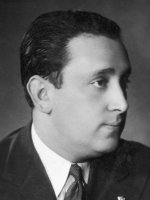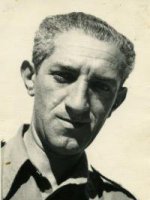Eugeniusz Bodo is a Actor, Director and Scriptwriter Polonais born on 29 december 1899 at Geneva (Suisse)
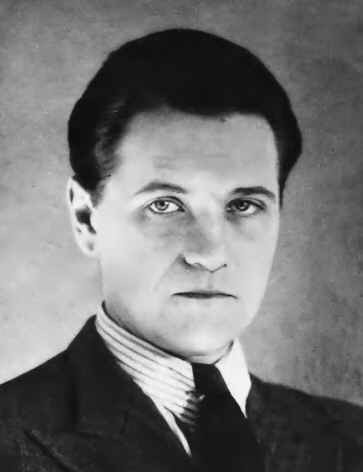
Eugeniusz Bodo (born Bohdan Eugène Junod; 1899 – 1943) was a film director, producer and one of the most popular Polish actors and comedians of the inter-war period. He starred in some of the most popular Polish film productions of the 1930s, including His Excellency, The Shop Assistant (Polish: Jego ekscelencja subiekt), Czy Lucyna to dziewczyna? and Pieśniarz Warszawy. A skilled singer, he became one of the icons of Polish musical comedies of the time and a symbol of Polish commercial cinema. Towards the end of that decade he also became a successful entrepreneur, a co-owner of a successful film studio, a café and a producers company. Arrested by the Soviets in the aftermath of the German and Soviet invasion of Poland, he perished in the Gulag.
In 1917 Junod moved to Poznań where he joined "Teatr Apollo". In 1919 (under a new stage name of Eugeniusz Bodo, the surname created from the initials of his own first name Bohdan and his mother's - Dorota) he started acting in various Warsaw-based theatres, variétés and cabarets (Qui Pro Quo, Perskie Oko and Cyrulik Warszawski being the most famous). He also played major roles in Warsaw-based "Teatr Polski" and Wilno-based "Teatr Lutnia".
He is best known for his film roles; he played in more than thirty films. His screen debut was a 1925 silent film Rywale. With the advent of sound film Bodo in a matter of years became one of the best-known Polish actors. Usually appearing in musical comedies, already in 1932 he was voted the King of Polish Actors by the Film magazine's readers. His popularity rose following three mistaken identity comedies: 1933 His Excellency, The Shop Assistant, 1935 His Excellency, the Chauffeur (both directed by Michał Waszyński and co-starring Ina Benita) and 1934 Czy Lucyna to dziewczyna? (co-starring Jadwiga Smosarska). Always appearing well-dressed, in 1936 Bodo was awarded the title of King of Style by the readers of Film magazine.
In 1931 Bodo became a co-founder of the B.W.B. film studio, and, in 1933, he opened a private producers' company "Urania", named after his fathers' cinema in Łódź. His best-known film was 1937 Piętro wyżej, which he wrote and produced himself. On 10 January 1939 Bodo with his business partner Zygmunt Woyciechowski opened a restaurant and a café - the "Café Bodo" - at Warsaw's prestigious Pierackiego street (modern Foksal). By that time his popularity reached far beyond the borders of Poland, to the extent that Yugoslavian press dubbed him Polish Maurice Chevalier. Bodo himself toured Germany promoting Polish-made feature films on that market.
During the Invasion of Poland he organized recitals for the Polish soldiers and civilians during the Siege of Warsaw. He then fled to Lwów, where he joined the Tea-Jazz band led by Henryk Wars. With that troupe he toured Soviet Union in 1940, he also published a record containing Russian-language versions of his songs. Simultaneously he started efforts to leave the Soviet Union using his Swiss passport. However, shortly after the German invasion of the Soviet Union he was arrested by the NKVD and sentenced to 5 years. Initially imprisoned in Butyrki prison in Moscow, he was not released following the Sikorski-Mayski Agreement as the Soviet authorities argued that he was not a Pole but rather a Swiss citizen and hence the Amnesty for Polish citizens in the Soviet Union did not apply to him. Eugeniusz Bodo starved to death on his way to a remote Soviet GULAG camp, in Kotlas. He was declared dead on 7 October 1943.
His whereabouts remained unknown for another 50 years, before the collapse of communism in 1989 the Soviets gave the false version that Bodo had been murdered by the Germans in 1941. This version is repeated even in some modern publications. It was only in 1991 that the Soviet authorities revealed his fate. The tragic circumstances surrounding Bodo's death became the subject of a documentary by Stanisław Janicki Eugeniusz Bodo: Za winy niepopełnione (For Crimes Not Committed). The title of the 1997 documentary refers to a 1938 film in which Bodo starred.
In October 2011 in Kotlas, where he died, a cenotaph in his honor was unveiled at a local cemetery.
Source : Wikidata
Eugeniusz Bodo

Birth name Bohdan Eugène Junod
Nationality Pologne
Birth 29 december 1899 at Geneva (Suisse)
Death 7 october 1943 (at 43 years) at Kirov (Russie)
Nationality Pologne
Birth 29 december 1899 at Geneva (Suisse)
Death 7 october 1943 (at 43 years) at Kirov (Russie)
Biography
Bohdan Eugène Junod was born on 28 December 1899. His birthplace however is not certain, sources mention Warsaw, Łódź and Geneva, Switzerland. His mother was Jadwiga Anna Dorota née Dylewska. His father, Teodor Junod, was a Swiss citizen who moved to Russian-held Poland and in 1903 settled in Łódź. There he opened a revue-cinema Urania - the first permanent cinema theatre in that city. It was there that Bodo made his stage debut at the age of six.In 1917 Junod moved to Poznań where he joined "Teatr Apollo". In 1919 (under a new stage name of Eugeniusz Bodo, the surname created from the initials of his own first name Bohdan and his mother's - Dorota) he started acting in various Warsaw-based theatres, variétés and cabarets (Qui Pro Quo, Perskie Oko and Cyrulik Warszawski being the most famous). He also played major roles in Warsaw-based "Teatr Polski" and Wilno-based "Teatr Lutnia".
He is best known for his film roles; he played in more than thirty films. His screen debut was a 1925 silent film Rywale. With the advent of sound film Bodo in a matter of years became one of the best-known Polish actors. Usually appearing in musical comedies, already in 1932 he was voted the King of Polish Actors by the Film magazine's readers. His popularity rose following three mistaken identity comedies: 1933 His Excellency, The Shop Assistant, 1935 His Excellency, the Chauffeur (both directed by Michał Waszyński and co-starring Ina Benita) and 1934 Czy Lucyna to dziewczyna? (co-starring Jadwiga Smosarska). Always appearing well-dressed, in 1936 Bodo was awarded the title of King of Style by the readers of Film magazine.
In 1931 Bodo became a co-founder of the B.W.B. film studio, and, in 1933, he opened a private producers' company "Urania", named after his fathers' cinema in Łódź. His best-known film was 1937 Piętro wyżej, which he wrote and produced himself. On 10 January 1939 Bodo with his business partner Zygmunt Woyciechowski opened a restaurant and a café - the "Café Bodo" - at Warsaw's prestigious Pierackiego street (modern Foksal). By that time his popularity reached far beyond the borders of Poland, to the extent that Yugoslavian press dubbed him Polish Maurice Chevalier. Bodo himself toured Germany promoting Polish-made feature films on that market.
During the Invasion of Poland he organized recitals for the Polish soldiers and civilians during the Siege of Warsaw. He then fled to Lwów, where he joined the Tea-Jazz band led by Henryk Wars. With that troupe he toured Soviet Union in 1940, he also published a record containing Russian-language versions of his songs. Simultaneously he started efforts to leave the Soviet Union using his Swiss passport. However, shortly after the German invasion of the Soviet Union he was arrested by the NKVD and sentenced to 5 years. Initially imprisoned in Butyrki prison in Moscow, he was not released following the Sikorski-Mayski Agreement as the Soviet authorities argued that he was not a Pole but rather a Swiss citizen and hence the Amnesty for Polish citizens in the Soviet Union did not apply to him. Eugeniusz Bodo starved to death on his way to a remote Soviet GULAG camp, in Kotlas. He was declared dead on 7 October 1943.
His whereabouts remained unknown for another 50 years, before the collapse of communism in 1989 the Soviets gave the false version that Bodo had been murdered by the Germans in 1941. This version is repeated even in some modern publications. It was only in 1991 that the Soviet authorities revealed his fate. The tragic circumstances surrounding Bodo's death became the subject of a documentary by Stanisław Janicki Eugeniusz Bodo: Za winy niepopełnione (For Crimes Not Committed). The title of the 1997 documentary refers to a 1938 film in which Bodo starred.
In October 2011 in Kotlas, where he died, a cenotaph in his honor was unveiled at a local cemetery.
Usually with
Filmography of Eugeniusz Bodo (15 films)
Actor
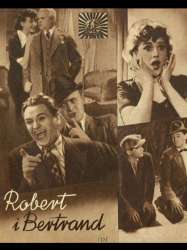
Robert and Bertrand (1938)
, 1h20Directed by Mieczysław Krawicz
Origin Pologne
Genres Comedy
Themes Films based on plays
Actors Eugeniusz Bodo, Helena Grossówna, Adolf Dymsza, Mieczysława Ćwiklińska, Antoni Fertner, Michał Znicz
Roles Bertrand
Rating64%





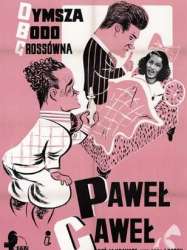
Paweł & Gaweł (1938)
, 1h22Directed by Mieczysław Krawicz
Origin Pologne
Genres Comedy, Romance
Actors Eugeniusz Bodo, Adolf Dymsza, Helena Grossówna, Józef Orwid, Ludwik Sempoliński, Tadeusz Fijewski
Roles Paweł Gawlicki
Rating70%






Za winy niepopełnione (1938)
, 1h32Directed by Eugeniusz Bodo
Origin Pologne
Genres Drama
Actors Kazimierz Junosza-Stępowski, Eugeniusz Bodo, Wojciech Brydziński
Roles Torence, wspólnik Holskiego
Rating70%






Bohaterowie Sybiru (1936)
Directed by Michał Waszyński
Genres Drama
Actors Krystyna Ankwicz, Adam Brodzisz, Eugeniusz Bodo, Kazimierz Junosza-Stępowski, Feliks Chmurkowski, Mieczysław Cybulski
Rating66%






The Honorable Chauffeur (1935)
, 1h20Directed by Michał Waszyński
Genres Comedy, Romantic comedy
Actors Eugeniusz Bodo, Antoni Fertner, Ludwik Sempoliński, Wiktor Biegański, Feliks Chmurkowski, Loda Niemirzanka
Roles Count Karol Boratynski
Rating63%






Black Pearl (1934)
, 1h15Directed by Michał Waszyński
Genres Drama, Crime, Romance
Actors Eugeniusz Bodo, Lena Żelichowska, Michał Znicz, Franciszek Brodniewicz
Roles Stefan Nadolski
Rating56%






Love, Cherish, Respect (1934)
Directed by Michał Waszyński
Genres Comedy, Romantic comedy, Romance
Actors Eugeniusz Bodo, Loda Halama, Zula Pogorzelska, Władysław Walter, Michał Znicz, Helena Zarembina
Roles Władysław
Rating64%





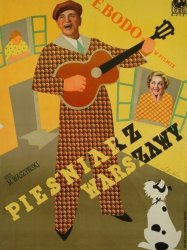
Pieśniarz Warszawy (1934)
, 54minutesDirected by Michał Waszyński
Genres Comedy, Musical
Actors Wiktor Biegański, Eugeniusz Bodo, Maria Gorczyńska, Michał Znicz, Władysław Walter, Stanisław Łapiński
Rating64%






Ekscelencja Jurek (1933)
Directed by Michał Waszyński
Genres Comedy, Romantic comedy, Romance
Actors Eugeniusz Bodo, Konrad Tom, Mieczysława Ćwiklińska, Wiktor Biegański, Zygmunt Chmielewski, Andrzej Bogucki
Roles Jurek, the shop assistant
Rating67%





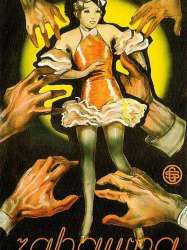
The Toy (1933)
, 1h20Directed by Michał Waszyński
Genres Drama, Romance
Actors Alma Kar, Eugeniusz Bodo, Jerzy Marr, Wiktor Biegański, Helena Zarembina, Stanisław Sielański
Roles Kuzma, the forester's son
Rating60%






Nameless Heroes (1932)
Directed by Michał Waszyński
Genres Crime, Romance
Actors Maria Bogda, Adam Brodzisz, Stefan Jaracz, Eugeniusz Bodo, Wiktor Biegański, Zula Pogorzelska
Roles Komisarz Szczerbic

Sound of the Desert (1932)
, 1h18Directed by Michał Waszyński
Genres Adventure, Romance
Actors Eugeniusz Bodo, Maria Bogda, Adam Brodzisz, Witold Conti, Paweł Owerłło
Roles Sheik Abdullah
Rating49%






The Cult of the Body (1930)
, 1h40Directed by Michał Waszyński
Genres Drama, Romance
Actors Victor Varconi, Krystyna Ankwicz, Eugeniusz Bodo, Paweł Owerłło
Roles Franciszek
Rating56%






Exile to Siberia (1930)
, 1h29Directed by Henryk Szaro
Origin Pologne
Genres Drama, Historical, Romance
Themes Political films
Actors Adam Brodzisz, Jadwiga Smosarska, Eugeniusz Bodo, Bogusław Samborski, Mira Zimińska
Rating65%





During the Revolution of 1905, a young Polish revolutionary is arrested in Warsaw and set to Siberia by the Russian authorities. His girlfriend travels out and helps him escape.
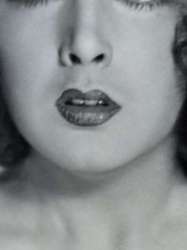
A dangerous affair (1930)
Directed by Michał Waszyński
Origin Pologne
Genres Drama, Crime, Romance
Actors Bogusław Samborski, Betty Amann, Eugeniusz Bodo, Zula Pogorzelska, Adolf Dymsza, Kazimierz Krukowski
Rating28%





 Connection
Connection
